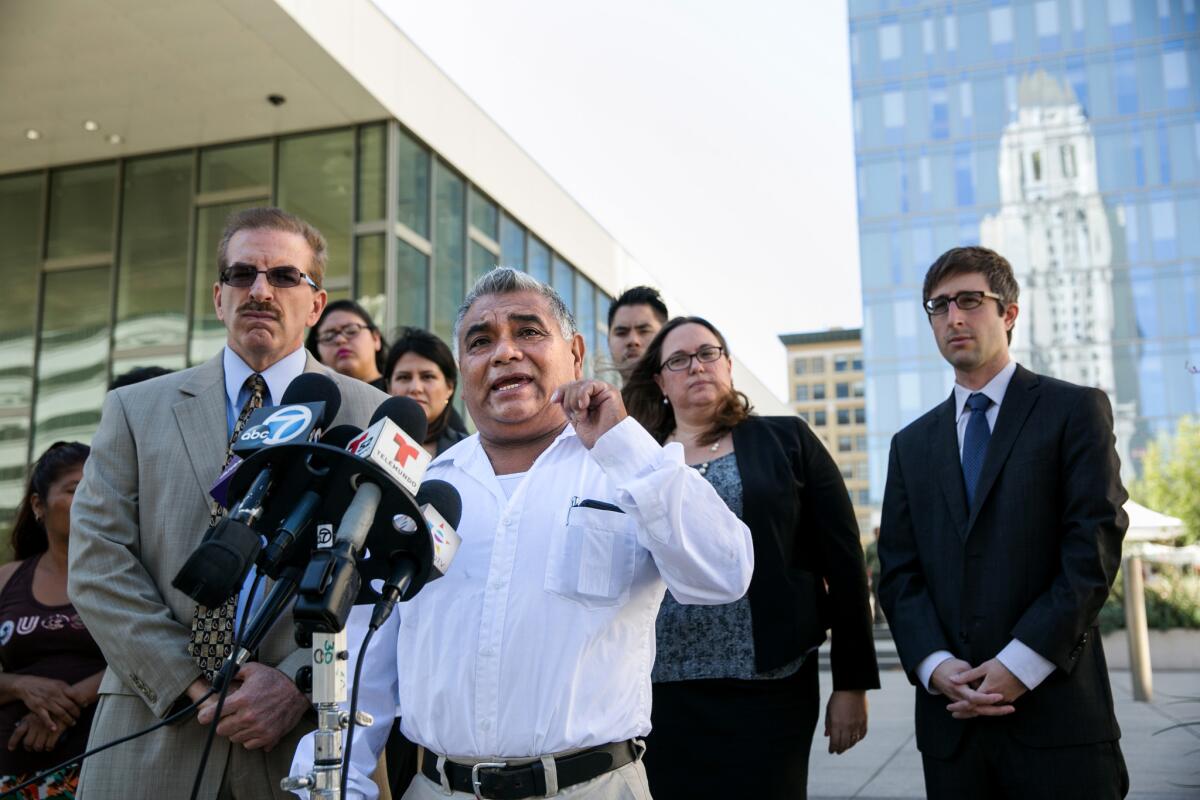Sidewalk vendors sue L.A., say city seized their carts and belongings

Aureliano Santiago, a street vendor, center, answers questions from reporters during a news conference outside of L.A. police headquarters. Street vendors and their allies are suing Los Angeles in federal court over the alleged seizure of their carts and other belongings, arguing that the practice is unconstitutional.
- Share via
Street vendors and their allies are suing Los Angeles in federal court, claiming their carts and other belongings have been improperly seized and destroyed and arguing that the practice is unconstitutional.
“All of us as civil rights lawyers are appalled at this outrageous and illegal behavior,” National Lawyers Guild attorney Cynthia Anderson-Barker said at a news conference Thursday outside Los Angeles Police Department headquarters. “We want it to stop.”
Selling food or goods on public sidewalks is illegal in the city. If officers take carts or other goods to be booked as evidence, they are supposed to provide receipts so vendors can reclaim them, according to the suit. Instead, vendors claim that Los Angeles police have simply trashed or confiscated their wares without handing them receipts, even if the owners are not being arrested.
Lawyers from groups including the Legal Aid Foundation of Los Angeles, the ACLU Foundation of Southern California and the National Lawyers Guild say the practice violates the rights to receive due process and be free from unreasonable seizures. Vendors have no way to challenge the punishment or get their property back before it is thrown away, they say.
Civil rights attorney Carol Sobel told reporters the seized goods were not being taken as evidence of a crime. Even if they were, the city would have to properly inventory and preserve them, she said. For instance, if someone failed to clean up after their dog, “you don’t get to seize their dog and destroy it,” Sobel said.
The Los Angeles Police Department and the office of City Atty. Mike Feuer declined to respond to the allegations, saying that they do not comment on pending litigation. Police have disputed similar claims made by sidewalk vendors in the past, saying that sometimes vendors don’t get the necessary receipts in the mail because they give officers a false address.
L.A. has already been sued over destroying the belongings of homeless people who allegedly left their items unattended on sidewalks — a practice ruled unconstitutional by a federal appeals court three years ago. This time around, Sobel and other local lawyers are representing an alliance of sidewalk vendors called the Union Popular de Vendedores Ambulantes or, roughly, the Popular Union of Street Vendors.
“This is the seventh time that the city of Los Angeles has been sued for taking the property of poor people and destroying it without notice.... You’d think they’d get the message,” Sobel said. The vendors and their attorneys are seeking to halt the disputed practices, obtain a ruling that they are unconstitutional and secure an undetermined amount of damages for Aureliano Santiago, a 62-year-old ice cream vendor who says his property has been confiscated repeatedly. He estimated that the cart and goods seized each time are worth roughly $300 — enough to cover bills and expenses for his family.
“They don’t have value for them. But for me, they have a lot of value,” Santiago said.
The lawsuit also targets the Fashion District Business Improvement District, claiming it has worked with police to seize and destroy carts and other vendor property such as umbrellas and coolers while vendors have been forced to stand aside. The business improvement district, which is funded by property owners in the area, contracts with cleanup crews that pick up 6 tons of trash in the Fashion District daily.
Kent Smith, executive director of the business improvement district, said the crews dispose of items when county health officials and police enforce the city rules against illegal vending. He said the group played a “limited” role and did not want to unlawfully take away property from anyone.
“We simply dispose of perishable, contaminated and abandoned property that would otherwise be left in our district,” Smith said in a written statement. He added that he was disappointed that the attorneys were suing the business improvement district, rather than trying to work together, saying it was “clearly not mere coincidence” that the lawsuit was filed after district leaders publicly raised concerns about unpermitted vending.
The legal challenge comes as L.A. lawmakers are embroiled in a debate over legalizing sidewalk vending: Local vendors and their allies have pushed to allow their trade, arguing that it would bolster the economy, revitalize streets and halt the criminalization of poor vendors struggling to make ends meet. Violations of the current law can lead to fines of as much as $1,000 and jail time.
But critics — including many business and neighborhood groups — argue that a blanket legalization for sidewalk vending could block and sully walkways and put bricks-and-mortar businesses at a disadvantage. Many have pushed for neighborhoods to be able to decide one by one whether vending would be allowed.
Follow @latimesemily on Twitter for what’s happening at Los Angeles City Hall.
ALSO:
Why is the Coliseum so quiet? Changes may be on the way
Mystery deepens over deaths of two women found in Montecito Heights park
LAPD sergeant who detained ‘Django’ actress accused of violating ethics rules
More to Read
Sign up for Essential California
The most important California stories and recommendations in your inbox every morning.
You may occasionally receive promotional content from the Los Angeles Times.














